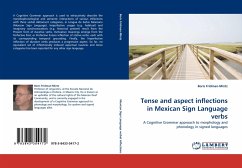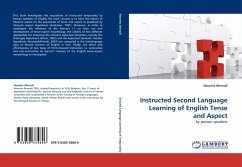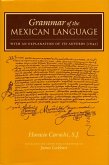A Cognitive Grammar approach is used to exhaustively describe the morphophonological and semantic interactions of various inflections with three verbal Aktionsort categories, in Lengua de Señas Mexicana (Mexican Sign Language). Imperfective usages (e.g. habitual) and imaginary synchronizations (e.g. historical present) result from the Present form of durative verbs. Inchoative meanings emerge from the Perfective Past, or Perfective Future inflection of stative verbs, each with its corresponding temporal grounding. Finally, the Imperfective inflection of durative verbs produces a progressive aspect. So far, no equivalent set of inflectionally induced aspectual nuances and tense categories has been reported for any other sign language.
Bitte wählen Sie Ihr Anliegen aus.
Rechnungen
Retourenschein anfordern
Bestellstatus
Storno








